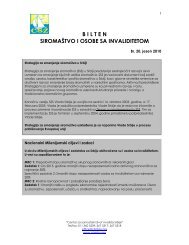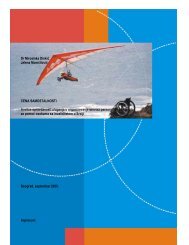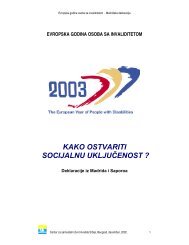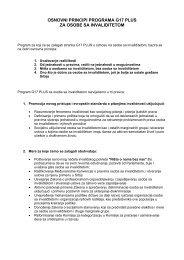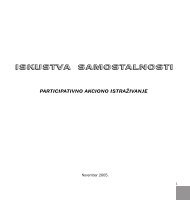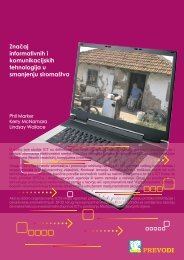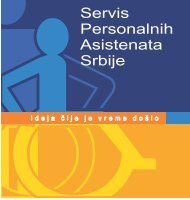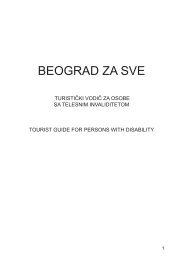OBAVEZA ZAPOŠLJAVANJA OSOBA SA INVALIDITETOM U SRBIJI Primeri dobre prakse
Preuzmite ovde - Centar za samostalni Život osoba sa invaliditetom ...
Preuzmite ovde - Centar za samostalni Život osoba sa invaliditetom ...
Create successful ePaper yourself
Turn your PDF publications into a flip-book with our unique Google optimized e-Paper software.
istrazivanja<br />
in this sample were employed after the new Law and its provisions on mandatory<br />
employment. The average length of current employment is 8 months and the most<br />
important institutions in the recruitment process was the National Employment<br />
Bureau.<br />
Employees with disabilities mostly performing basic jobs, support, maintenance,<br />
security (71.8%) and services, and least numerous are professional jobs. Despite this,<br />
69.7% of PWDs believes that the work they perform meet or at least partially<br />
correspond to the competencies that they got through their education.<br />
Rregarded to respondents, adaptation of working environment is needed in 57.7%<br />
and half of them address adjustment to organizational conditions. Almost all<br />
respondents expressed satisfaction with the job adjustment (93.3%). This would mean<br />
that a third of workplaces (35.7%) had already been adjusted or does not require<br />
adjustment. Psychosocial working conditions are generally good and on a scale based<br />
on model requires - job resources (Job Demands-Resources Model) their score is<br />
higher than the average.<br />
In 98.7% of employees with disabilities do not feel discriminated in their organization.<br />
It is to expect that employment and involvement in ones community, reduce and<br />
almost shut off the subjective experience of discrimination. After the new Law almost<br />
half (42.3%) of respondents feel safe in terms of employment and on the other hand<br />
for unemployed persons with disabilities prevailing sense of insecurity.<br />
Nearly 75% of employees with disabilities in Serbia had an income below the average.<br />
The distribution of earnings is consistent with the educational structure but more with<br />
the jobs and work tasks performed by employees with disabilities. The largest number<br />
of persons with disabilities (60.3%) had a monthly salary that ranges from 15 to 25<br />
thousand dinars. The standard of living in households of employees with disabilities,<br />
according to respondents, is average as the largest number (46.2%) live "moderately".<br />
The share of the families that live "good" (17.9%) and living a "bad" (20.5%) is almost<br />
even. The key difference is in the presence of families with disabled member(s) who<br />
live "very good" (2.6%) and families "very poor" (12.8%). According to employees with<br />
disabilities their employment is reflected in the improved financial situation of their<br />
household and the standard of living for the whole family.<br />
Employers<br />
As for the employers, before the new Law, only half of surveyed employers had<br />
previously employed persons with disabilities. Yet relatively few meet the mandatory<br />
quota (6.8%) employing persons with disabilities during this period. Currently<br />
situation is that there are still fewer PWDs are employed than it is prescribed. Just<br />
around 20% of employers have employed only one person with a disability. Only 11%<br />
of employers are adapting workplaces and work processes to persons with disabilities.<br />
The largest number of employers (50.0%) selects candidates with disabilities in<br />
cooperation with NEB. Some of them decides, besides the cooperation with the NEB<br />
(16.1%) to contact and cooperate with other actors in the local community. These are<br />
20




